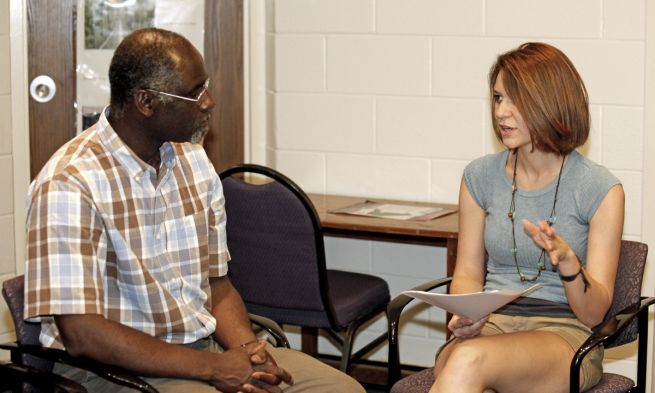Critical thinking beyond the classroom
Being the Change
A professor challenging your research can help you find your passion
By Jamie Marsh
Katie Sensabaugh (’12) first met JMU professor David Owusu-Ansah at Mad-RUSH, an undergraduate research conference hosted by JMU’s College of Arts and Letters. Sensabaugh was one of 100 students from across the East Coast who presented papers on specialized research topics. After Sensabaugh’s 20-minute presentation about the harmful consequences of media publicity during the 2010 World Cup in South Africa, (”The Media, the World Cup, and Apartheid“), Owusu-Ansah, professor of history and special assistant to the president for faculty diversity, challenged her findings and took her thinking to a ”new level,“ Sensabaugh says. ”I learned as much from a 15-minute conversation with Dr. Owusu-Ansah as spending a semester in research on the same topic.“
Madison: How did you choose your Mad-RUSH research topic?Jamie Marsh caught up with professor and student, on behalf of Madison magazine, and the conversation continued. And as Sensabaugh shares, the exchange has had a long-term impact on her Madison Experience.
Katie Sensabaugh (’12): I wrote my paper for my Media and Politics class. I had visited South Africa and was considering declaring a minor in African studies, but I couldn’t find room in my schedule since I already had a double major. I was trying to make my coursework focus on Africa whenever possible.
Madison: And what was the main thing you learned?
Sensabaugh: Basically, I looked at contemporary news accounts arguing that the World Cup had a negative impact on South Africa. Not only were the local people displaced to make way for massive stadium projects, but most of the money went to international corporations rather than local entrepreneurs. South Africa could have spent money on improving low-income housing, for example, rather than building infrastructure for the event. As for media coverage, the only taste of African culture that the everyday tourist or television viewer received was the sound of the vuvuzela, and even that was limited.
Madison: Were you expecting feedback at Mad-RUSH?
Sensabaugh: Yes, that’s part of the conference program, but I didn’t know an African history expert was in the room! I called my mom right after the conference because Dr. Owusu-Ansah really made me think about my work. While he commended many of my thoughts, I realized that I hadn’t grasped the full picture in my research. He said my findings may be true, but argued the World Cup was still a huge step forward.
Madison: Professor Owusu-Ansah, can you expand on that?
David Owusu-Ansah: First, let me say Katie did a great job and her findings are valid. My comments focused on why the authorities in South Africa saw the successful conduct of the game to be important. Psychologically, it proved two things: that Africa was capable of conduct and planning usually reserved for advanced economies. They said, ’We can do what Brazil and the United Emirates have done. We can make an air-conditioned stadium in a desert.‘ Second, it showed that black political leaders were as able as the white minority government in managing large-scale events. Everyone expected the project to explode, but that didn’t happen. It did a lot for the psychology of South Africans.
Sensabaugh: Those comments made me think more long term. All the literature I read was so negative, but Professor Owusu-Ansah cited future benefits from the increase in nationalism and pride.
Owusu-Ansah: Exactly! Even though people were forced out of their homes to build a stadium, I questioned whether it was a total waste of national resources. The poor also got many miles of roads, temporary construction jobs, opportunities to sell goods, and the psychological relief of accomplishing what they said they could do. For the poor, maybe the long-term benefits will outweigh the immediate.
Madison: Katie, how has this conversation affected your studies?
Sensabaugh: It helped confirm that I am really passionate about South Africa, so I’ve continued seeking ways to study the nation. After graduation, I hope to work at South Africa’s famous Truth and Reconciliation Commission.
Madison: Is this type of intellectual exchange common for undergrads at JMU?
Sensabaugh: Oh yes. I’ve had the chance to have conversations with many experts where I’m treated on an equal playing field. If you come prepared, most professors will have one-on-one conversations with you, anytime.
Owusu-Ansah: Even though JMU is a big university, operation-wise, we don’t think of ourselves that way. We look for students to work with side-by-side, to have graduate-level kinds of interactions. This is the kind of student whom I, as a professor, always want to nurture.
